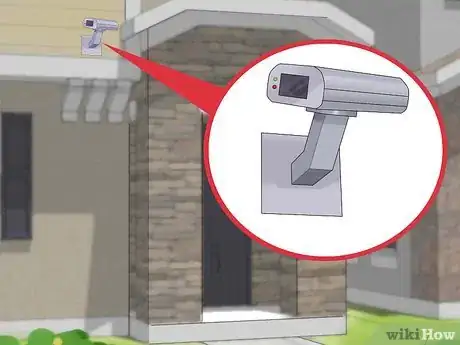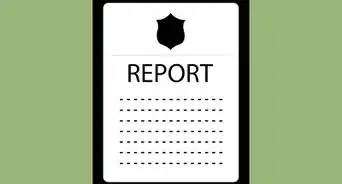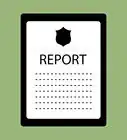X
This article was co-authored by Clinton M. Sandvick, JD, PhD. Clinton M. Sandvick worked as a civil litigator in California for over 7 years. He received his JD from the University of Wisconsin-Madison in 1998 and his PhD in American History from the University of Oregon in 2013.
This article has been viewed 26,371 times.
In 2010, there were over two million burglaries, which caused over 4.5 billion dollars in lost property. The average burglary costs over $2,000 in lost property.[1] If you see a burglary occurring, you should report it to the police. As the victim of a burglary, you can seek compensation from any homeowners or renters insurance policy that you might have.
Steps
Part 1
Part 1 of 3:
Preparing to Report the Burglary
-
1Understand burglary. Burglary is a violent felony. It is the unlawful entry into a structure coupled with the intent to commit a felony or theft. The “structure” can be a house, apartment, barn, office, stable, or vessel (e.g. ship).[2] Accordingly, if you give someone permission to enter the building, then that person has not committed burglary.
- Burglary often happens at night, but it doesn’t need to. It is illegal to enter a building unlawfully during the daytime as well.[3]
- Even if you gave someone permission to enter a building, you should still report any crime that they commit. If a house guest steals from you, then report the theft.
-
2Do not confront the burglar. If you are in your home when it is burglarized, or if you see someone burglar a neighbor’s home, you should not confront the person. You don’t know if a burglar is armed, or if he is high or emotionally unstable. Someone willing to burglar a home could be willing to physically harm someone who confronts him.
- If you are in the house, try to quietly move to a room that has a lock on the door. Take any cell phone with you so that you can call the police.
Advertisement -
3Pay attention to the burglar’s appearance. Should you be able to safely observer the burglar, then try to pay attention to his appearance. Relevant characteristics include:[4]
- height
- general age
- race
- gender
- hair color
- any distinguishing characteristics, such as a limp or facial tattoo
- clothing
- the direction the burglar went after leaving the house
Advertisement
Part 2
Part 2 of 3:
Reporting a Burglary to the Police
-
1Call the police. If you don’t know the number to your local police department, call 9-1-1. You can report anonymously if you like. However, realize that if you report anonymously then you might not be able to testify for the state if it prosecutes the burglar.
- If you come home and see that the house has been robbed, you shouldn’t go through the house. Instead, step outside and use a cell phone to call the police. Alternately, you can go to a neighbor’s house and ask to use the phone.
-
2File a report. An owner should file an incident report with the police as soon as possible.[5] Provide the police with any information that you have about the burglar and the property stolen.
-
3Don’t touch anything. Wait for the police to arrive before going inside. If you jump inside ahead of them, you risk contaminating the crime scene. You might walk over the burglar’s footprints in the carpeting, for example. Alternately, you might smudge fingerprints off objects.
-
4Share any surveillance video with the police. You might have security cameras installed at your house. If so, they may have captured the break-in. You should share any video with the police and, later, with your insurance company.[8]
- Be prepared for how emotional viewing the footage could be. Seeing someone violate your privacy can be very upsetting.
- Surveillance video can be helpful for addressing weaknesses in your home security. After the shock of the burglary has passed, you should take some time to go through your house and address weaknesses in security. For example, you may have seen that a burglar accessed your bedroom window by climbing onto a low-hanging tree branch. You could then cut down the branch so that future burglars cannot get inside that way.
Advertisement
Part 3
Part 3 of 3:
Reporting a Burglary to an Insurance Company
-
1Analyze if you want to report. If you report a burglary, then you will likely face higher insurance premiums in the future. Accordingly, you might not want to report the burglary to your insurance company.[9]
- There is also a chance that your policy could be cancelled. Some policies state that the insurer retains the right to modify or cancel the policy depending on the number of reports that you make. If you have made claims before with your insurer, you might not want to make another.
- Your policy may also have a deductible. As with health insurance, the deductible is the amount of money you must pay out-of-pocket before the insurer will kick in and cover the remaining loss.[10] If the burglary resulted in a loss equal to or less than the deductible amount, then you might not want to file a claim with your insurer.
-
2Call your insurance company. Individuals with homeowners or renters insurance are probably covered for a burglary. Do not wait to make a claim. Instead, call within 24 hours.[11]
- To find a contact number, look at your insurance contract. Alternately, you could look in the phone book or search on the web.
-
3Document damage. A claims adjuster could be sent over to your house to investigate in person. You should try to avoid cleaning up until the adjuster arrives. If you need to spend the night elsewhere, then do so after you secure your home as best as possible.[12]
- Gather receipts for any big ticket items that were destroyed or stolen. Anything that can help you establish the value of the objects that were taken or destroyed should be found and retained.[13]
-
4File a claim. The insurance company should give you a form to fill out. You can list your stolen or damaged property. Include the following information:[14]
- when and where the item was purchased
- the cost of the item
- the brand and model of the item
-
5Provide requested information. The insurance company might want to see a copy of the police report or other documents. Be sure to provide requested documents as soon as possible. Also keep a copy of documents for your records.
Advertisement
References
- ↑ https://www.fbi.gov/about-us/cjis/ucr/crime-in-the-u.s/2010/crime-in-the-u.s.-2010/property-crime/burglarymain
- ↑ https://www.fbi.gov/about-us/cjis/ucr/crime-in-the-u.s/2010/crime-in-the-u.s.-2010/property-crime/burglarymain
- ↑ http://www.nolo.com/legal-encyclopedia/burglary-basics-32640.html
- ↑ http://www.safewise.com/home-security-faq/house-break-in
- ↑ http://www.safewise.com/home-security-faq/house-break-in
- ↑ http://www.safewise.com/home-security-faq/house-break-in
- ↑ https://homesite.com/insurance-resources/home-insurance-articles/what-to-expect-when-filing-a-theft-claim.htm
- ↑ http://www.safewise.com/home-security-faq/house-break-in
- ↑ http://homeguides.sfgate.com/impact-burglary-reports-homeowners-insurance-7068.html
- ↑ http://homeguides.sfgate.com/impact-burglary-reports-homeowners-insurance-7068.html
- ↑ http://www.safewise.com/home-security-faq/house-break-in
- ↑ http://www.safewise.com/home-security-faq/house-break-in
- ↑ https://homesite.com/insurance-resources/home-insurance-articles/what-to-expect-when-filing-a-theft-claim.htm
- ↑ https://homesite.com/insurance-resources/home-insurance-articles/what-to-expect-when-filing-a-theft-claim.htm
- ↑ http://www.safewise.com/home-security-faq/house-break-in
About This Article
Advertisement







































































